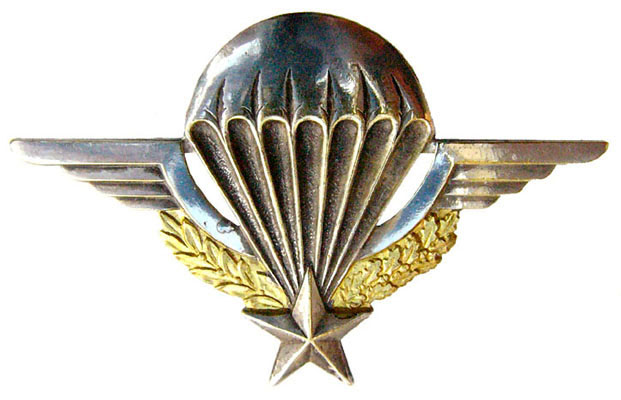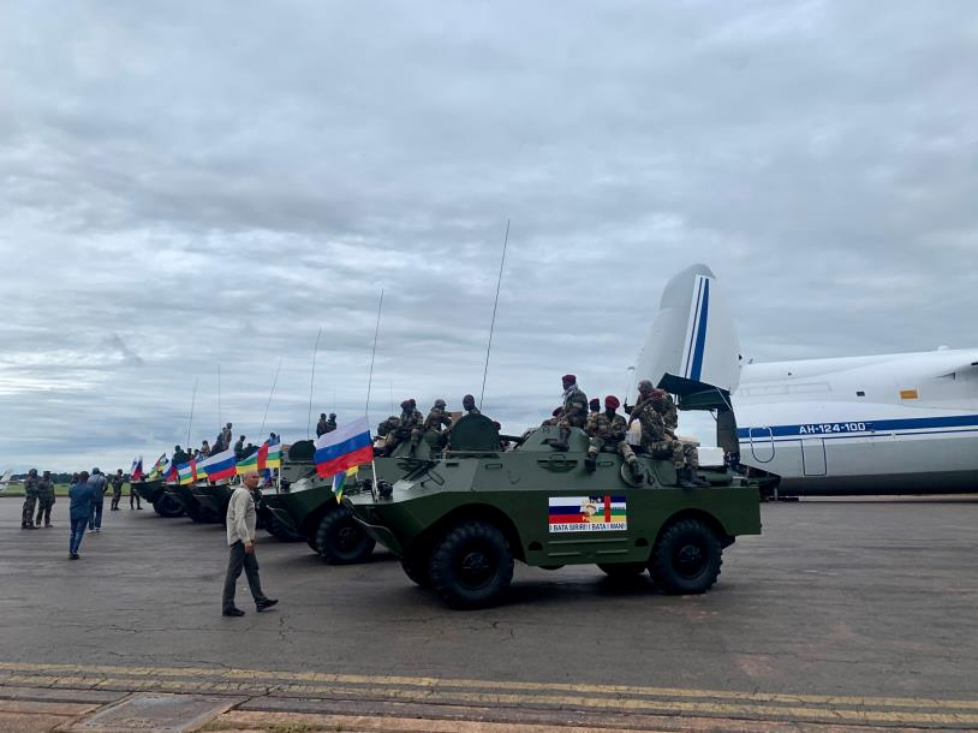|
Benoît Puga
Benoît Puga (born 30 January 1953) is a general in the French Army and the Grand Chancellor of the National Order of the Legion of Honour and the National Order of Merit. Military career Puga joined the École spéciale militaire de Saint-Cyr in September 1973, at the age of 20, following which he joined the Infantry Application School in 1975 with a rank of sous-lieutenant. In September 1976, Puga joined the 1st Chasseur Group at Reims as an infantry section chief (french: chef de section) before becoming a platoon missile section chief. From August to October, he conducted a tour at the corps of reconnaissance helicopter unit of the 2e ACR belonging to the VIIth U.S. Army Corps stationed at Nuremberg in Germany. He was promoted to the rank of lieutenant on 1 August 1976. On 1 April 1978, Puga was assigned to the 2nd Foreign Parachute Regiment 2e REP, where he was, in succession, section chief, assistant officer, and commander of a company in a unit combat capacity. Accordin ... [...More Info...] [...Related Items...] OR: [Wikipedia] [Google] [Baidu] |
Legion Of Honour
The National Order of the Legion of Honour (french: Ordre national de la Légion d'honneur), formerly the Royal Order of the Legion of Honour ('), is the highest French order of merit, both military and civil. Established in 1802 by Napoleon Bonaparte, it has been retained (with occasional slight alterations) by all later French governments and regimes. The order's motto is ' ("Honour and Fatherland"); its seat is the Palais de la Légion d'Honneur next to the Musée d'Orsay, on the left bank of the Seine in Paris. The order is divided into five degrees of increasing distinction: ' (Knight), ' (Officer), ' ( Commander), ' (Grand Officer) and ' ( Grand Cross). History Consulate During the French Revolution, all of the French orders of chivalry were abolished and replaced with Weapons of Honour. It was the wish of Napoleon Bonaparte, the First Consul, to create a reward to commend civilians and soldiers. From this wish was instituted a , a body of men that was not an o ... [...More Info...] [...Related Items...] OR: [Wikipedia] [Google] [Baidu] |
Special Operations Command (France)
The Commandement des Opérations Spéciales ( en, Special Operations Command) or COS is a joint staff charged with overseeing the various special forces of the French Army, Navy and Air and Space Force, bringing them all under a single operational authority. The command is placed under the orders of the Chief of Defence Staff and under the direct authority of the President of the French Republic.Aleksander Olech, French and Polish fight against terrorism, Poznan 2022, p. 106; https://www.researchgate.net/publication/359135918_French_and_Polish_fight_against_terrorism Similar in purpose to the USSOCOM or UKSF, the COS was created on June 24, 1992. The need for such a federation became apparent after France's participation in the First Gulf War. Organisation Army * Army Special Forces Command ** 1st Marine Infantry Parachute Regiment (1er RPIMa) ***Command and Logistics Company ***1 SAS Company - HAHO/HALO paratroopers and divers ***2 SAS Company - Extreme environments ***3 ... [...More Info...] [...Related Items...] OR: [Wikipedia] [Google] [Baidu] |
Djibouti
Djibouti, ar, جيبوتي ', french: link=no, Djibouti, so, Jabuuti officially the Republic of Djibouti, is a country in the Horn of Africa, bordered by Somalia to the south, Ethiopia to the southwest, Eritrea in the north, and the Red Sea and the Gulf of Aden to the east. The country has an area of . In antiquity, the territory, together with Ethiopia, Eritrea and Somaliland, was part of the Land of Punt. Nearby Zeila, now in Somaliland, was the seat of the medieval Adal and Ifat Sultanates. In the late 19th century, the colony of French Somaliland was established following treaties signed by the ruling Dir Somali sultans with the French, and its railroad to Dire Dawa (and later Addis Ababa) allowed it to quickly supersede Zeila as the port for southern Ethiopia and the Ogaden. It was renamed the French Territory of the Afars and the Issas in 1967. A decade later, the Djiboutian people voted for independence. This officially marked the establishment of the ' ... [...More Info...] [...Related Items...] OR: [Wikipedia] [Google] [Baidu] |
Gabon
Gabon (; ; snq, Ngabu), officially the Gabonese Republic (french: République gabonaise), is a country on the west coast of Central Africa. Located on the equator, it is bordered by Equatorial Guinea to the northwest, Cameroon to the north, the Republic of the Congo on the east and south, and the Gulf of Guinea to the west. It has an area of nearly and its population is estimated at million people. There are coastal plains, mountains (the Cristal Mountains and the Chaillu Massif in the centre), and a savanna in the east. Since its independence from France in 1960, the sovereign state of Gabon has had three presidents. In the 1990s, it introduced a multi-party system and a democratic constitution that aimed for a more transparent electoral process and reformed some governmental institutions. With petroleum and foreign private investment, it has the fourth highest HDI in the region (after Mauritius, Seychelles and South Africa) and the fifth highest GDP per capita ( ... [...More Info...] [...Related Items...] OR: [Wikipedia] [Google] [Baidu] |
Zaire
Zaire (, ), officially the Republic of Zaire (french: République du Zaïre, link=no, ), was a Congolese state from 1971 to 1997 in Central Africa that was previously and is now again known as the Democratic Republic of the Congo. Zaire was, by area, the third-largest country in Africa (after Sudan and Algeria), and the 11th-largest country in the world. With a population of over 23 million inhabitants, Zaire was the most-populous officially Francophone country in Africa, as well as one of the most populous in Africa. The country was a one-party totalitarian military dictatorship, run by Mobutu Sese Seko and his ruling Popular Movement of the Revolution party. Zaire was established following Mobutu's seizure of power in a military coup in 1965, following five years of political upheaval following independence from Belgium known as the Congo Crisis. Zaire had a strongly centralist constitution, and foreign assets were nationalized. The period is sometimes referr ... [...More Info...] [...Related Items...] OR: [Wikipedia] [Google] [Baidu] |
Ranks In The French Army
: ''See Ranks in the French Navy for more details about the naval ranks'' Rank insignia in the French Army are worn on the sleeve or on shoulder marks of uniforms, and range up to the highest rank of Marshal of France, a state honour denoted with a seven-star insignia that was last conferred posthumously on Marie Pierre Koenig in 1984. Infantry arms and cavalry arms Rank insignia in the French army depend on whether the soldier belongs to an infantry or cavalry unit. The infantry arms () include normal infantry, naval troops, the Foreign Legion and engineers; cavalry arms () include armoured cavalry, artillery, maintenance and logistics. Sleeves are emblazoned with marks denoting either gold insignia for the infantry or silver/white for the cavalry. However, the artillery uses gold as the main colour, despite being a cavalry branch, and spahis use gold as the main colour despite being part of the cavalry, a distinction representing the armoured cavalry. Marshal The title o ... [...More Info...] [...Related Items...] OR: [Wikipedia] [Google] [Baidu] |
Chancellor
Chancellor ( la, cancellarius) is a title of various official positions in the governments of many nations. The original chancellors were the of Roman courts of justice—ushers, who sat at the or lattice work screens of a basilica or law court, which separated the judge and counsel from the audience. A chancellor's office is called a chancellery or chancery. The word is now used in the titles of many various officers in various settings (government, education, religion). Nowadays the term is most often used to describe: *The head of the government *A person in charge of foreign affairs *A person with duties related to justice *A person in charge of financial and economic issues *The head of a university Governmental positions Head of government Austria The Chancellor of Austria, denominated ' for males and ' for females, is the title of the head of the Government of Austria. Since 2021, the Chancellor of Austria is Karl Nehammer. Germany The Chancellor of Germany, denomi ... [...More Info...] [...Related Items...] OR: [Wikipedia] [Google] [Baidu] |
Republic Of The Congo Civil War (1997–99)
Republic of the Congo Civil War may refer to: *Republic of the Congo Civil War (1993–1994) The First Republic of the Congo Civil War was the first of two ethnopolitical civil conflicts in the Republic of the Congo, beginning in 1993 and continuing until December 1994. The causes of the civil war laid in the disputed 1993 parliamen ... * Republic of the Congo Civil War (1997–1999) {{disambig ... [...More Info...] [...Related Items...] OR: [Wikipedia] [Google] [Baidu] |
Central African Armed Forces
The Central African Armed Forces (french: Forces armées centrafricaines; FACA) are the armed forces of the Central African Republic and have been barely functional since the outbreak of the civil war in 2012. Today they are among the world's weakest armed forces, dependent on international support to provide security in the country. In recent years the government has struggled to form a unified national army. It consists of the Ground Force (which includes the air service), the gendarmerie, and the National Police. Its disloyalty to the president came to the fore during the mutinies in 1996–1997, and since then has faced internal problems. It has been strongly criticised by human rights organisations due to terrorism, including killings, torture and sexual violence. In 2013 when militants of the Séléka rebel coalition seized power and overthrew President Bozizé they executed many FACA troops. History Role of military in domestic politics The military has played an import ... [...More Info...] [...Related Items...] OR: [Wikipedia] [Google] [Baidu] |
Yugoslav Wars
The Yugoslav Wars were a series of separate but related Naimark (2003), p. xvii. ethnic conflicts, wars of independence, and insurgencies that took place in the SFR Yugoslavia from 1991 to 2001. The conflicts both led up to and resulted from the breakup of Yugoslavia, which began in mid-1991, into six independent countries matching the six entities known as republics which previously composed Yugoslavia: Slovenia, Croatia, Bosnia and Herzegovina, Montenegro, Serbia, and North Macedonia (previously named ''Macedonia''). Yugoslavia's constituent republics declared independence due to unresolved tensions between ethnic minorities in the new countries, which fuelled the wars. While most of the conflicts ended through peace accords that involved full international recognition of new states, they resulted in a massive number of deaths as well as severe economic damage to the region. During the initial stages of the breakup of Yugoslavia, the Yugoslav People's Army (JNA) sought to ... [...More Info...] [...Related Items...] OR: [Wikipedia] [Google] [Baidu] |
Operation Manta
Operation Manta was a French military intervention in Chad between 1983 and 1984, during the Chadian–Libyan conflict. The operation was prompted by the invasion of Chad by a joint force of Libyan units and Chadian Transitional Government of National Unity (GUNT) rebels in June 1983. While France was at first reluctant to participate, the Libyan air-bombing of the strategic oasis of Faya-Largeau starting on July 31 led to the assembling in Chad of 3,500 French troops, the biggest French intervention since the end of the colonial era. The French troops, instead of attempting to expel the Libyan forces from Chad, drew a "line in the sand". They concentrated their forces on the 15th parallel, the so-called "Red Line," (later moved up to the 16th parallel) to block the Libyan and GUNT advance towards the N'Djamena, thus saving the Chadian President Hissène Habré. The Libyan and rebel forces also avoided attacking across the Red Line and provoking the French. The resulting im ... [...More Info...] [...Related Items...] OR: [Wikipedia] [Google] [Baidu] |


